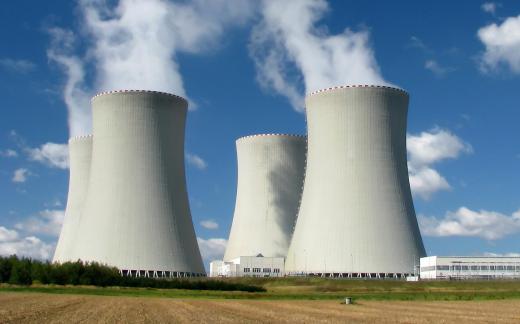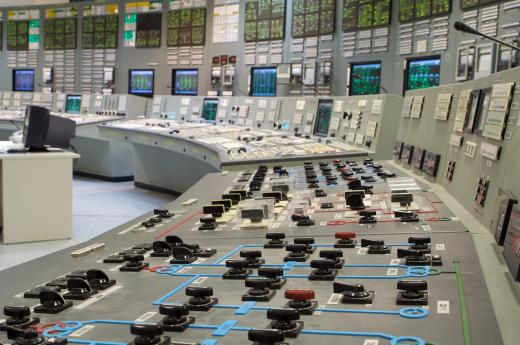What is Nuclear Physics?
 Mary McMahon
Mary McMahon
Nuclear physics is a branch of the physics field which is concerned with the structure of atomic nuclei, and the understanding of potential ways in which to manipulate atomic nuclei. This branch of physics dates to the early 20th century, when scientists began to realize that the atom had a structure, and that understanding this structure could be important. The most infamous application of nuclear physics was probably the development of the atom bomb in the 1940s, but the field has many more applications, including highly beneficial ones.
Some people group particle physics in with nuclear physics, although technically particle physics should be viewed as its own field. Particle physics is an offshoot of this field, but particle physicists take their research in very different directions, and work with different kinds of natural phenomena.

One of the most diverse applications of nuclear physics is in medicine. The work of nuclear physicists is behind a number of medical imaging techniques which are used to provide non-invasive looks into the body. Radioactive isotopes utilized in the treatment of some medical conditions such as cancer are also the product of research in nuclear physics, with physicists learning about such isotopes and how they can be applied safely and effectively to address medical problems.

Certain aspects of engineering require a knowledge of nuclear physics, most notably in nuclear engineering, a field which involves the development of nuclear power plants which can do anything from generating electricity to powering submarines. Radiocarbon dating, a technique used in geology and archeology, is also a product of nuclear physics. People in this profession may also work with astronomers, using their knowledge to help date the universe, explain physical phenomena, and design experiments. As seen from these examples, nuclear weapons represent only a small aspect of this field in physics.

People who are interested in careers in nuclear physics should plan on spending a lot of time in school. A physicist in this field generally gets a bachelor of science degree in physics, following this degree with graduate level work. Graduate work offers physicists a chance to develop an area of specialty, and to conduct research which may advance the field. Once qualified, a nuclear physicist can work in an academic setting, for a government agency, or for a private company, such as a company which offers radiocarbon dating services or runs nuclear power plants.
AS FEATURED ON:
AS FEATURED ON:
















Discussion Comments
@glasshouse- I took an introduction to physics class and my professor stated that nuclear waste management would see a lot of research and development in the near term. Nuclear waste management is a pressing issue, as most power plants have no way to permanently store their nuclear waste.
Multiple approaches offer opportunities in different research fields. Some scientists are looking for ways to neutralize radioactive material through nuclear digesters (I think that is what they are called). Others are researching repository style waste management techniques. Still others are researching reprocessing waste and more elaborate disposal ideas. The field should be wide open for years to come as there is literally tons of nuclear waste in need of disposal.
@cougars- Nuclear reactor physics may be under distress at the moment, but there are still a number of branches of nuclear physics that are seeing advancements in innovation. Quantum physics, nuclear chemistry, nuclear medicine, and other branches of nuclear science are working to solve a number of the planet’s most pressing issues as well as innovate new ways to save people’s lives.
I also think that there will be a resurgence in nuclear power physics, especially in the area of modular nuclear power technology, nuclear fusion technology, and nuclear propulsion. These are safer, proliferation proof technologies that offer less risk than current nuclear technologies.
I wonder if nuclear reactor physics will soon become a lost art in the developed world as the aftermath of the Japanese nuclear meltdown is causing a global fallout in the nuclear power industry. Germany recently decided to close all of their nuclear reactors by the year 2022, and they have already shut down a handful of reactors permanently after the disaster. The country was already on edge after the Chernobyl disaster caused a large radioactive cloud to form over the country.
Germany will join Switzerland as another European country to completely phase out nuclear power in favor of renewable energy and gas fired turbines. While the proponents of nuclear power rightfully claim that the number of disasters is less than any other power source, the damage from a single disaster can be in the hundreds of billions of dollars, lead to a high rate of casualty and cancer, and has effects that last decades or more.
The industry is already in decline, but this could be a major blow to an industry struggling in many of the world's developed nations. I guess I will just have to wait and see.
Post your comments